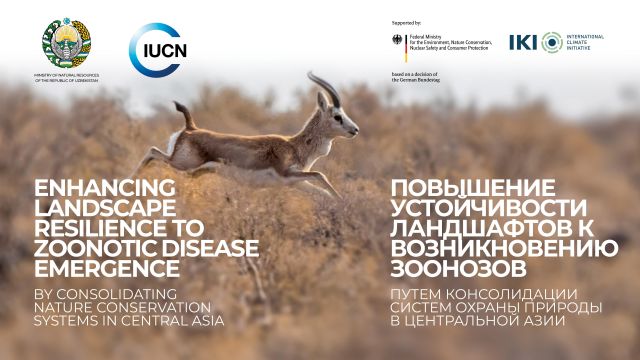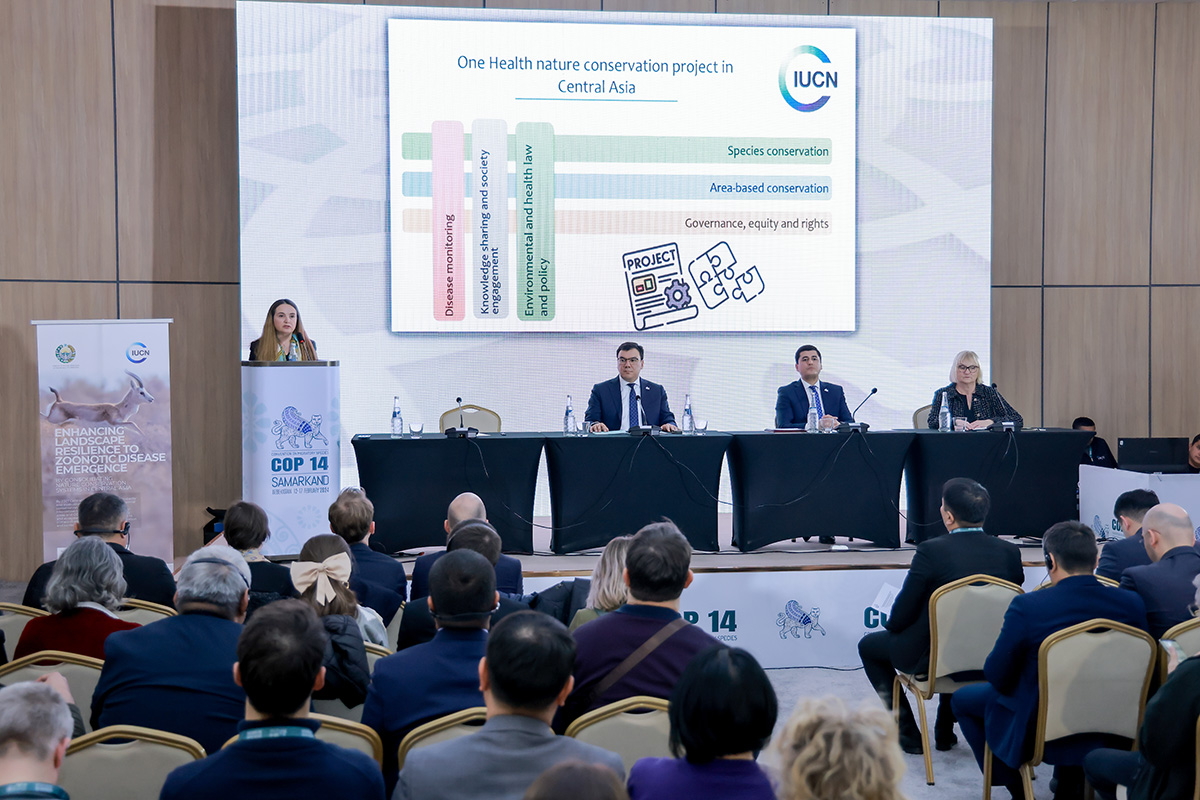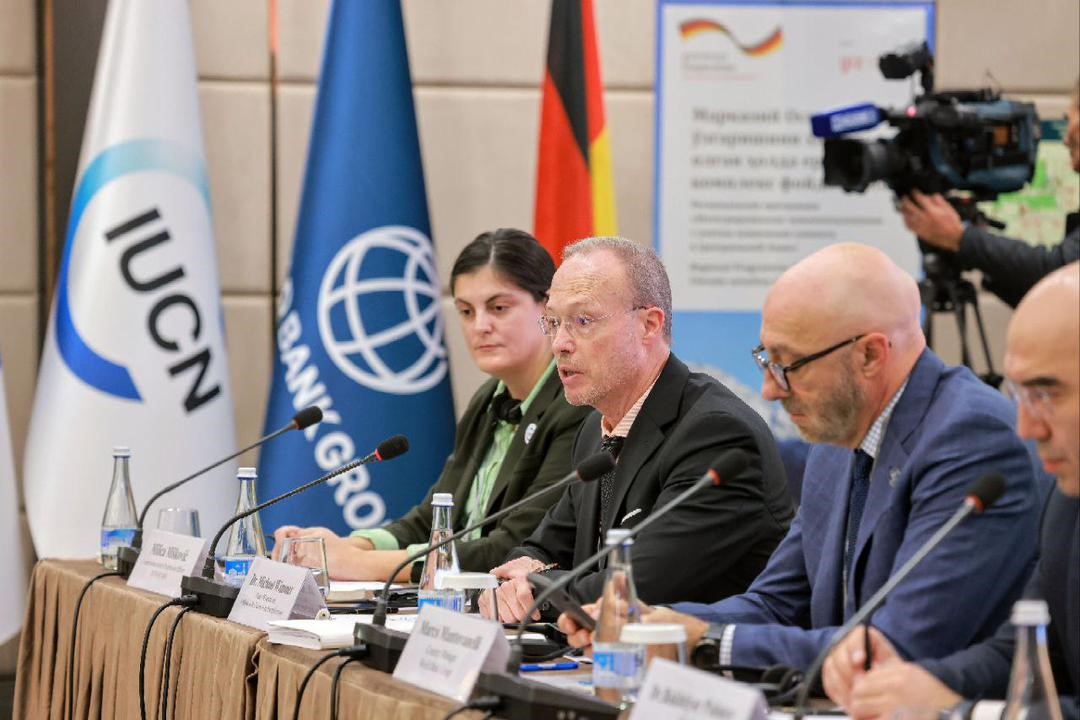Strong regional commitment to One Health approach in Central Asia
Five Central Asian countries have jointly confirmed their interest to mitigate the risk of zoonosis emergence in the region by enhancing overall landscape resilience through the One Health approach. The commitments were shared today, closing out a three day regional workshop in Tashkent, co-hosted by the Ministry of Natural Resources of Uzbekistan and IUCN.
Natural processes that regulate disease occurrence and transmission are adversely affected by climate change, disturbance and fragmentation of habitats, and increased contact between humans, wildlife and domesticated species - participants from all five Central Asian countries have agreed, highlighting the need for more effective and equitable area-based conservation.
“It is well known that biodiversity loss, ecosystem degradation and climate change combined increase the risks of zoonotic disease outbreaks. We are interested to support the coordinated efforts among Central Asian countries to address those risks by raising awareness about the linkages between conservation, ecosystem health and human well-being”, said Aziz Abdukhakimov, Minister of Natural Resources of the Republic of Uzbekistan, addressing the participants in Tashkent.
With the support of IUCN and international partners, national authorities and experts are ready to take steps towards improving the effective governance and management of protected and conserved areas, and build the resilience of both ecosystems and society in facing these crises. The countries are willing to apply the One Health approach together with the IUCN Green List Standard of Protected and Conserved Areas for nature conservation, best practices related to species management and the latest knowledge on zoonosis research and technology.
“The One Health approach is relatively new within the International Climate Initiative (IKI), and we expect that this innovative effort led by IUCN with national and regional partners will set us on the path of understanding the interdependence of nature conservation and biodiversity, climate, human health and livelihoods, to the benefit of people and nature”, stressed Elke Steinmetz, Head of Division of International Cooperation on Biodiversity at the Federal Ministry for the Environment, Nature Conservation, Nuclear Safety and Consumer Protection (BMUV), a partner that is supporting the initial steps made in the region in this regard. “This project will be at the forefront of One Health globally and we are delighted to see how it evolves”, adds Mrs. Steinmetz.
The countries of Central Asia are ready to support designations of new protected areas, improve the effectiveness of existing protected areas, and recognise other effective area-based conservation measures (OECMs) while also looking into management practices and governance mechanisms for these areas. These efforts should result in the conservation outcomes beneficial to people, especially local communities and vulnerable groups, while also contributing to the global 30x30 target of the Convention on Biological Diversity.
“The regional commitment to strengthen One Health approach in Central Asia is a significant step towards building a society more resilient to zoonosis. Intact nature and well-governed conserved areas serve people and allow for the natural processes to flow without interruption, and can be seen as contributing solutions to societal challenges”, concluded Trevor Sandwith, Director of the IUCN Centre for Conservation Action.
National authorities, international partners and key stakeholders on various levels hope to build on the achievements and efforts made by now, aiming to improve national policy frameworks for effective area-based conservation in accordance with the One Health approach, and aligned with the new Global Biodiversity Framework.
These initial steps were made through a partner collaboration led by IUCN and involving the Ministry of Ecology and Natural Resources of Kazakhstan, Ministry of Natural Resources Ecology and Technical Supervision of Kyrgyzstan, Committee for Environmental Protection of Tajikistan, Ministry of Agriculture and Environmental Protection of Turkmenistan, Ministry of Natural Resources of Uzbekistan, Institute of Zoology of Kazakhstan, Camp Alatoo- Kyrgyzstan, Association of Nature Conservation Organisations of Tajikistan, Academy of Sciences of the Republic of Uzbekistan, Michael Succow Foundation, Secretariat of the Convention on Migratory Species, United Nations Environment Programme, World Conservation Monitoring Centre, and Zoological Society of London.
The initial activities related to One Health in Nature Conservation in Central Asia, including the abovementioned workshop were delivered in the frame of a project that is part of the International Climate Initiative (IKI). The Federal Ministry for the Environment, Nature Conservation, Nuclear Safety and Consumer Protection (BMUV) supports this initiative on the basis of a decision adopted by the German Bundestag.
More information: https://www.international-climate-initiative.com/PROJECT1763-1




